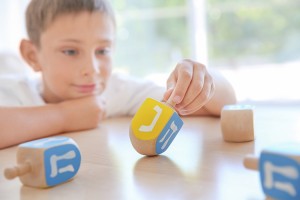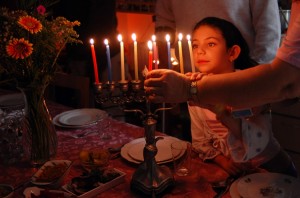Have a Safe and Happy Hanukkah!
Thursday, December 10th, 2020
A boy plays with a four-sided top called a dreidel, a favorite Hanukkah pastime.
Credit: © Africa Studio, Shutterstock
Today marks the first day of the Jewish holiday Hanukkah, also known as the Festival of Lights. The holiday is a celebration of God’s deliverance of the Jews in 165 B.C. That year, the Jews won their first struggle for religious freedom by defeating the Syrians, who wanted them to give up Judaism. Hanukkah lasts for 8 days. The dates of Hanukkah shift slightly from year to year, because the Hebrew calendar is based on cycles of the moon. This year, Hanukkah lasts from Thursday, December 10 through Friday, December 18.
The holiday commemorates and celebrates an event that took place in the winter of 165 B.C. A group of Jews led by Judah Maccabee captured the Temple in Jerusalem from forces loyal to Antiochus IV. Antiochus was a Syrian ruler who had tried to wipe out all distinctive Jewish beliefs and practices. Judah and his men immediately cleared pagan idols from the Temple, which they rededicated to the God of Israel.
Two ancient writings, called 1 and 2 Maccabees, tell the story of the Jewish struggle, in which many Jews died defending their traditions. These writings highlight warfare, directed by the Lord himself. Later Jewish accounts emphasize something not mentioned in earlier writings. They tell that when the Jews searched for pure oil to light the Temple’s menorah (multi-branched lamp), they found only one day’s supply. Miraculously, the oil lasted for eight days, by which time more oil had been located. This story is the source of Hanukkah’s most popular nickname, the Festival of Lights.
Among the oldest Hanukkah traditions is the lighting of hanukkiyahs, special menorahs with eight branches. Hanukkah foods include latkes (potato pancakes) and sufganiyot (jelly-filled doughnuts). These treats fried in oil recall the miracle of the oil in the Temple. Children play games with a four-sided top called a dreidel, decorated with writing that also recalls the Hanukkah miracle.
During the 1900’s, Hanukkah gained importance and popularity. Like the Christmas holiday, which falls around the same time of year, Hanukkah has become increasingly commercial. In Western countries, giving and receiving gifts has become a central part of both holidays, especially for many children.
Like so many holidays this year, Hanukkah might look different than in years past. In many places, efforts are being made to prevent the spread of the pandemic (global outbreak of disease) of COVID-19. Such methods often include social distancing, meant to limit contact among people and thus the spread of germs. But limiting the spread of germs doesn’t mean you can’t have eight days of joy!
One socially distant way to enjoy the holiday is to have a virtual cooking class with friends and family. You can make such Hanukkah favorites as latkes or rugelach. Rugelach is pastry filled with such sweet treats as raisins, cinnamon, or marmalade. You can also make dreidels and send them to your friends. If you must visit friends or relatives, wash your hands or use hand sanitizer before and after greeting others. Wearing a protective face mask when not eating can help prevent the spread of disease. However you choose to celebrate, we hope you have a safe and fun Hanukkah!



